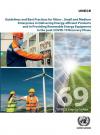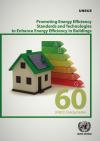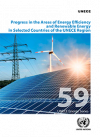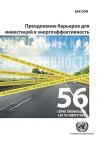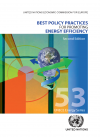Energy Efficiency
Introduction

Matters related to energy efficiency are among the priority areas of work of the Committee on Sustainable Energy, and are addressed by one of its subsidiary bodies – the Group of Experts on Energy Efficiency. The Group of Experts works to help achieve significant improvements in energy efficiency as energy resource of its own right, that would limit growth or even reduce energy consumption, help improve access to affordable, reliable, sustainable and modern energy for all, and reduce greenhouse gas emissions and carbon footprint of the energy sector: the cleanest, and arguably most affordable source of energy is the one that has not been used
Broader and expeditious deployment of energy efficiency measures across buildings, industry, transport, and other end-use sectors serves maintaining and increasing resilience of energy systems in a cost-effective manner, improves their durability and flexibility, reduces system's redundancy, and strengthens ability to absorb shocks and recover.
Stakeholders need to rethink energy efficiency, as well as the resource use optimization that it offers. As part of such perception change, energy efficiency must be fundamentally embedded and prioritized in energy policies and development strategies - to achieve higher systemic efficiencies and ensure overall net benefits to the energy system and its actors throughout the value chain.
The Group of Experts on Energy Efficiency holds its annual sessions and serves as a platform for inclusive expert dialogue focusing on regulatory and policy dialogue and addressing financial, technical and policy barriers with the aim to strengthen regional cooperation and cross-sectoral action on energy efficiency. In the intersessional period, the Group of Experts implements concrete and result-oriented activities, including, but not limited to hosting thematic events and undertaking research and analysis. To join the Group of Experts and participate in its activities, please contact us.
The Group of Experts also oversees and manages activities of its three thematic Task Forces.
- Task Force on Industrial Energy Efficiency
-
- capacity-building activities aiding increased collaboration between policymakers and the industrial sector and exchange of experience and information sharing on barriers, drivers, and options for improving energy efficiency and energy productivity in industry;
- research addressing evolving priorities, challenges, and opportunities in advancing industrial energy efficiency;
- identification of best practices in increasing energy efficiency in key industries, and development of policy actions to foster implementation of energy efficiency measures and progress towards carbon neutrality in industry.
- Joint Task Force on Energy Efficiency Standards in Buildings
-
Coordinated by the Committees on Sustainable Energy Division and on Urban Development, Housing and Land Management
- maintenance and update of Framework Guidelines on Energy Efficiency Standards in Buildings;
- management of ECE High-Performance Buildings Initiative and its Centres of Excellence that undertake research, provide implementation-oriented advanced education and assistance, and aim to deploy the Framework Guidelines;
- workshops and train-the-trainer seminars on high-performance buildings and energy efficiency standards, in line with the Framework Guidelines.
- Task Force on Digitalization in Energy
-
- monitoring of new and emerging trends in the digitalization in energy domain, that enable advances in connectivity, data, analytics, optimization of the overall energy infrastructure, and can greatly increase overall efficiency of the energy system;
- in-depth research and comprehensive assessment of opportunities and challenges that digitalization presents to the energy system, including notably the socio-economic context, to provide a clear, concise and balanced view to policymakers and other stakeholders;
- workshops, information sharing sessions, roundtables for policymakers on relevant topics, to bridge the gap between academic research, industrial innovations, and policy needs;
- serving as an umbrella for the subsidiary bodies of the Committee on Sustainable Energy to conduct relevant research and assess sectoral opportunities and challenges.
| ENG | FRE | RUS | |
|
ECE/ENERGY/2023/10 - Work Plan of the Group of Experts on Energy Efficiency for 2024-2025 |
Quick access to previous sessions of the Group of Experts
| Tenth session: 5-6 October 2023 |
| Ninth session: 3-4 October 2022 |
| Eighth session: 20-21 September 2021 |
| Seventh session: 22-23 September 2020 |
| Sixth session: 7-8 October 2019 |
| Fifth session: 13-15 November 2018 |
| Fourth session: 31 October - 1 November 2017 |
| Third session: 18-19 October 2016 |
| Second session: 5-6 November 2015 |
| First session: 17-18 November 2014 |
Key areas of work
Highlights
Materials of the ninth session of the Group of Experts on Energy Efficiency (Geneva and online, 3-4 October 2022) are available.





